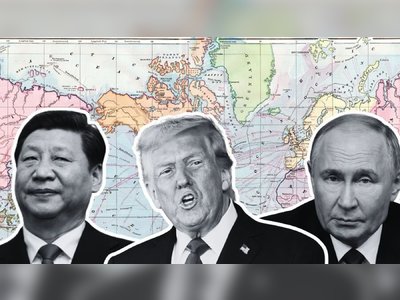Global Economic Indicators Show Mixed Signals Amid Ongoing Volatility
Major economies face inflation, supply chain challenges, and geopolitical tensions
Recent reports have indicated that major economies around the world are experiencing a complex mix of economic challenges and opportunities as they navigate through the ongoing impacts of the COVID-19 pandemic, inflationary pressures, and geopolitical tensions.
In the United States, inflation rates have remained persistently above the Federal Reserve's target.
The Consumer Price Index (CPI) reported an annual increase of approximately 3.7% as of September 2023, marking a slight decrease from previous months but still indicating significant cost-of-living pressures for American households.
In an effort to combat inflation, the Federal Reserve indicated the possibility of further monetary tightening, raising interest rates as needed.
In Europe, the Eurozone economy has shown signs of resilience with a GDP growth of about 0.4% in the second quarter of 2023, driven by strong consumer spending and easing supply chain disruptions.
However, inflation remains a concern, with rates hovering around 5.2%.
The European Central Bank has enacted a series of interest rate hikes in an attempt to control rising prices, further complicating the recovery as the cost of borrowing increases for businesses and consumers.
Asian markets have also been affected.
In China, economic growth in the third quarter showed a continuation of a slowdown, with GDP growth estimated at 4.5%, down from earlier projections of 5.5% for the year.
Contributing factors include a significant decline in the real estate sector and weakened consumer confidence.
The Chinese government has implemented stimulus measures, including lower mortgage rates, to boost demand and stabilize the economy.
On the geopolitical front, tensions resulting from the ongoing conflict in Ukraine and trade disputes, particularly between the United States and China, are influencing market behavior and investment decisions.
Supply chain disruptions have persisted, impacting not only manufacturing sectors but also global energy prices, with Brent crude oil trading around $85 per barrel as of the latest data, reflecting fluctuations due to both demand concerns and production policies.
In response to these complex challenges, various governments are adopting tailored fiscal policies to stimulate growth without exacerbating inflation.
Investments in infrastructure and green technology are being prioritized as part of recovery strategies across different regions.
Global stock markets have mirrored these dynamics, with equities showing volatility.
Major indices in the United States have fluctuated, with the S&P 500 down about 5% year-to-date.
In Asia, indexes such as the Hang Seng Index have seen even sharper declines, impacted by investor sentiment surrounding China's economic outlook.
As world economies strive for stability, the interplay between inflation control, growth strategies, and geopolitical risks continues to challenge policymakers and market participants alike.
In the United States, inflation rates have remained persistently above the Federal Reserve's target.
The Consumer Price Index (CPI) reported an annual increase of approximately 3.7% as of September 2023, marking a slight decrease from previous months but still indicating significant cost-of-living pressures for American households.
In an effort to combat inflation, the Federal Reserve indicated the possibility of further monetary tightening, raising interest rates as needed.
In Europe, the Eurozone economy has shown signs of resilience with a GDP growth of about 0.4% in the second quarter of 2023, driven by strong consumer spending and easing supply chain disruptions.
However, inflation remains a concern, with rates hovering around 5.2%.
The European Central Bank has enacted a series of interest rate hikes in an attempt to control rising prices, further complicating the recovery as the cost of borrowing increases for businesses and consumers.
Asian markets have also been affected.
In China, economic growth in the third quarter showed a continuation of a slowdown, with GDP growth estimated at 4.5%, down from earlier projections of 5.5% for the year.
Contributing factors include a significant decline in the real estate sector and weakened consumer confidence.
The Chinese government has implemented stimulus measures, including lower mortgage rates, to boost demand and stabilize the economy.
On the geopolitical front, tensions resulting from the ongoing conflict in Ukraine and trade disputes, particularly between the United States and China, are influencing market behavior and investment decisions.
Supply chain disruptions have persisted, impacting not only manufacturing sectors but also global energy prices, with Brent crude oil trading around $85 per barrel as of the latest data, reflecting fluctuations due to both demand concerns and production policies.
In response to these complex challenges, various governments are adopting tailored fiscal policies to stimulate growth without exacerbating inflation.
Investments in infrastructure and green technology are being prioritized as part of recovery strategies across different regions.
Global stock markets have mirrored these dynamics, with equities showing volatility.
Major indices in the United States have fluctuated, with the S&P 500 down about 5% year-to-date.
In Asia, indexes such as the Hang Seng Index have seen even sharper declines, impacted by investor sentiment surrounding China's economic outlook.
As world economies strive for stability, the interplay between inflation control, growth strategies, and geopolitical risks continues to challenge policymakers and market participants alike.
AI Disclaimer: An advanced artificial intelligence (AI) system generated the content of this page on its own. This innovative technology conducts extensive research from a variety of reliable sources, performs rigorous fact-checking and verification, cleans up and balances biased or manipulated content, and presents a minimal factual summary that is just enough yet essential for you to function as an informed and educated citizen. Please keep in mind, however, that this system is an evolving technology, and as a result, the article may contain accidental inaccuracies or errors. We urge you to help us improve our site by reporting any inaccuracies you find using the "Contact Us" link at the bottom of this page. Your helpful feedback helps us improve our system and deliver more precise content. When you find an article of interest here, please look for the full and extensive coverage of this topic in traditional news sources, as they are written by professional journalists that we try to support, not replace. We appreciate your understanding and assistance.











